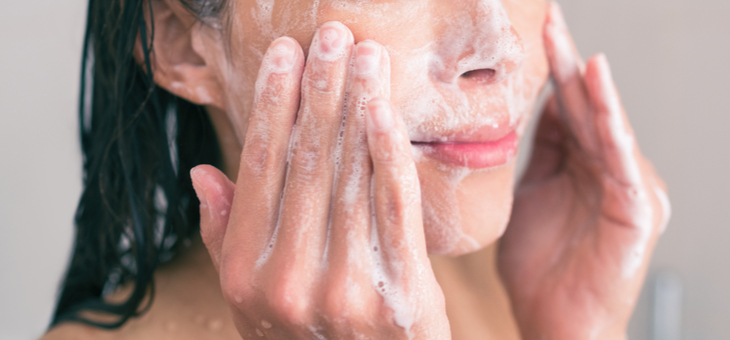It is important to wash your face in the morning and at night. Removing dirt, makeup and pollutants from your face before bed helps with your skin’s renewal and regeneration process. During the night your pores release toxins from your skin. If your pores are blocked these toxins will get caught in your skin, causing congestion and imperfections.
Identify your skin type
Everybody’s skin is different, so the best way to wash your face will differ from person to person. The first step is to identify what type of skin you have, as this will direct what products you should be using.
• Normal skin will have minimal blemishes, no serious sensitivities and isn’t too oily or dry.
• Sensitive skin often looks dry and red, and reacts poorly to some products and weather conditions.
• Oily skin is prone to large pores and blemishes, and often looks greasy.
• Dry skin often has more visible lines and flaky or reddish patches.
• Combination skin is a combination of normal, oily or dry.
Wash your hands
Washing your hands with soap helps to avoid rubbing bacteria and dirt over your face.
Wash your face
Dermatologist Dr Jennifer Haley told healthline.com that she recommends washing your face twice a day, emphasising the importance of a good night-time routine.
To reach your skin, you will need to remove the outer layers of makeup and dirt that cover it. You can use makeup remover, micellar water or natural alternatives such as coconut, almond or olive oil to gently remove this build up.
While using a loofah may make you feel as though you’re helping your skin, it may be doing more harm than good. Bacteria builds up in sponges, meaning you could be exposing your skin to more germs than you expected. It’s also important to use lukewarm water, as temperature extremes can damage your skin or trap grease inside pores.
Use your fingers to gently massage your face. It’s best to wash your whole face, as well as your neck and jawline. It’s important not to over wash, as your skin will compensate and produce more oil, making your skin greasier and more prone to blemishes.
Exfoliate
Exfoliating can either help or harm different skin types and conditions, so it may be best to consult a dermatologist about what exfoliant is best for you.
Ingredients containing glycolic acid, lactic acid or salicylic acid will exfoliate your skin. Other options include products containing sugar, salt, beads, fruit enzymes and other natural exfoliators. You can also use soft skincare brushes alongside your cleanser to gently remove dead skin and dirt.
Rinse
Use lukewarm water to thoroughly wash remnants of cleaner and exfoliants off your face. Splash your face to ensure the no soap remains, at it may cause irritation and block pores.
Dry
It’s important to make sure that the towel or cloth you use to dry your face is clean. Gently path your face, avoiding rubbing or rough contact as it will cause irritation.
Moisturise
It’s important to use a moisturiser after drying your face. They help with skin care and keeping your skin hydrated. If you have washed your face in the morning you may want to apply a moisturiser with an SPF rating to help protect your skin from sun damage throughout the day.
If you enjoy our content, don’t keep it to yourself. Share our free eNews with your friends and encourage them to sign up.
Related articles:
How to fight the ageing process
How to ensure your dreams are sweet
How to relieve a headache

